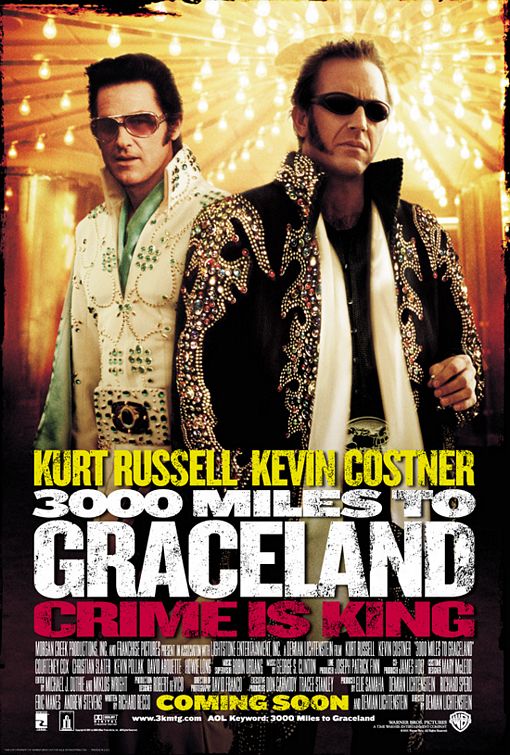“Psychopathic Film Making”

| None | Light | Moderate | Heavy | |
|---|---|---|---|---|
| Language | ||||
| Violence | ||||
| Sex | ||||
| Nudity |
What You Need To Know:
The pagan worldview in 3000 MILES TO GRACELAND turns a criminal into a hero by making him just a little less ruthless than the other criminals with whom he robs a Vegas casino. It also contains extreme violence that dehumanizes people, strong foul language, a couple strong fornication scenes, and other sexual immorality. This movie is one of the most abhorrent movies of the last three years
Content:
(PaPaPa, LLL, VVV, SS, NN, A, D, MMM) Corrupt pagan worldview that turns a criminal into a hero by making him just a little less ruthless than the other criminals with whom he robs a Vegas gambling casino; 103 mostly strong obscenities & 18 mostly strong profanities; extreme action violence including violent, deadly shootouts in casino & warehouse, off-screen murders, explosions, images of corpses, & highway patrolman loses old-fashioned gun duel with criminal, who then shoots the man in the head in a long-distance shot; depicted fornication, implied oral sex & wimpy man admits to cheating on his wife with secretary; upper male nudity, rear female nudity & man lies in bed with just a skimpy towel draped over his private parts; alcohol use; lots of smoking; and, stealing, gambling, young boy is a petty thief who idolizes criminal, betrayal, money laundering, adultery, some people escape justice, & federal marshal validates criminal’s desire to go out in a blaze of glory.
More Detail:
The late great director Don Siegel (INVASION OF THE BODY SNATCHERS and DIRTY HARRY) used to attack this kind of dispassionate, impersonal, uncaring character. Often in his movies, the “cool” heroes are tragic figures who, because of their past experiences, have become detached from the rest of humanity. In essence, like the horrific aliens in BODY SNATCHERS, the heroes have become inhuman pod people – sad, dehumanized figures who may look and act “cool” on the outside, but who have become cold, cynical and even misanthropic on the inside. During the mythic stories in Siegel’s movies, the cold hero encounters situations and tests, perhaps even a mad killer as in DIRTY HARRY, that helps return some sense of humanity to the hero but also may end in tragedy.
Thus, in Siegel’s marvelous war movie, HELL IS FOR HEROES, Steve McQueen plays a rude, cynical (but “cool!”) soldier in World War II who has become emotionally withdrawn from everyone. When he is put back on the front lines with a weary but energetic platoon of American soldiers, his encounters with the other men bring back a sense of humanity to him, a humanity that makes him sacrifice his life against a terrible machine gun nest of German soldiers in the movie’s powerful ending. In that same movie, Bobby Darin plays a cynical, profiteering (but “cool!”) soldier who, in an early scene, mocks God and the church in which the platoon is briefly staying. When Darin’s character sees the sacrifice McQueen’s character makes, he falls to his knees, recovers his faith in Christ, and makes the Sign of the Cross. Watching this scene has brought tears to many a tough war-movie fan’s eyes, including this one.
The new movie 3000 MILES TO GRACELAND is a movie that Siegel might have directed, except it lacks the depth of humanity and morality that Siegel brought to many, if not most, of his movies. In the story, Kurt Russell and Kevin Costner play leaders of a violent gang of robbers who rob a Las Vegas casino while they are dressed as Elvis Presley. Elvis was, of course, the epitome of “cool” in the 1950s and is still a powerful icon today, despite his tragic end. When Kevin Costner murderously betrays the gang, Russell finds he must rely on the help of a woman, played by Courtney Cox of TV’s FRIENDS, and her young son, a petty thief played by David Kaye. Cox’s character seems to betray Russell’s at one point, so for the second half of the movie, the “cool” professional criminal must decide whether he can trust her again, even when she desperately needs his help to protect her son from Costner’s evil psychopath. Also, if he does decide to help her out, it may mean that he has given his heart, mind and soul to this unstable but sexy and interesting woman and her mixed-up son, who needs a father figure in his life very badly.
This story may sound like one of Don Siegel’s excellent morality plays, but it is not! Instead (even though Russell’s character does make a commitment at the end and even though, unlike his chums, he refuses to kill the cops and security guards firing at them in the casino in the movie’s violent opening), Russell’s character gets away with the money stolen from the casino. Thus, the criminal “hero” escapes true justice. Also, a federal marshal at the end of the movie validates the psychopath’s decision to go out in a blaze of glory. “That’s what I would have done,” the marshal says in effect.
Thus, the worldview in 3000 MILES TO GRACELAND validates some pretty immoral messages. Not only that, but the movie contains very heavy gunfire in its two big action scenes. These scenes depict rampant, indiscriminate, murderous, dehumanizing gunfire of the kind that can greatly encourage such violence in real life. There is also a scene in longshot where the psychopath, after a patrolman decides to have a gunfighter duel with him on a two-lane highway, walks up to the man’s body and puts a couple more bullets into him, in his brain.
Finally, 3000 MILES TO GRACELAND contains lots of strong foul language, a couple strong fornication scenes and other sexual immorality. The movie rates very highly (or should we say lowly?) on MOVIEGUIDE®’s list of abhorrent movies in the last three years.
The rapturous, applauding viewers at the premiere of this ultra-violent, immoral movie that MOVIEGUIDE® attended in Hollywood may think Jesus Christ and his followers are not as “cool” as Elvis and the characters in this movie, but MOVIEGUIDE® thinks they’re the ones who have lost their “cool.” The kind of cool that really matters, the only kind of cool that can save them from the burning fires of Hell.


 - Content:
- Content: 

